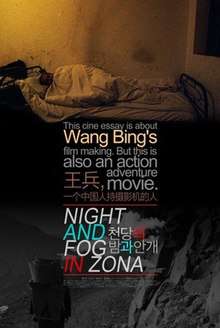Night and Fog in Zona
Night and Fog in Zona (Korean: 천당의 밤과 안개; RR: Cheon-dang-ui Bam-gwa An-gae) is a 2015 South Korean documentary film directed by Jung Sung-il. The cine-essay follows the renowned Chinese filmmaker Wang Bing as he works on two of his projects, 'Til Madness Do Us Part (2013) and Alone (2013). It made its world premiere at the 20th Busan International Film Festival in 2015.[1][2][3]
| Night and Fog in Zona | |
|---|---|
 | |
| Directed by | Jung Sung-il |
| Produced by | Kim Jong-won |
| Screenplay by | Jung Sung-il |
| Starring | Wang Bing |
| Music by | Lee Ji-yeon |
| Cinematography | Yang Gunyoung Lee Jin-keun |
| Edited by | Park Young-un Jung Sung-il |
Production company | KINO Film Production Co |
Release date |
|
Running time | 235 minutes |
| Country | South Korea |
| Language | Korean |
Synopsis
Jung Sung-il has always envied the Paris audiences of Lumière brothers' documentary film La Sortie de l'Usine Lumière à Lyon of December 28, 1895, but not anymore. In the winter of 2003 when he watched his old friend Wang Bing's first film Tie Xi Qu: West of the Tracks at the International Film Festival Rotterdam, he decided it was the first day of the digital cinema and also the day he wants to make Night and Fog in Zona.
One day, Wang invites him to Yunnan where he shoots a documentary. Jung follows with his camera, from a nameless suburb city to the jungle near Laos' border, to record that winter and the story of the people of China.[4][5]
Cast
Awards and nominations
| Year | Award | Category | Recipient | Result |
|---|---|---|---|---|
| 2019 | 6th Wildflower Film Awards[6] | Best Director (Documentaries) | Jung Sung-il | Won |
Reception
Il manifesto: "This film, based on the Master's take on cinema, is definitely one of the best non-fiction movies seen this year (2015), not only for its fascinating subject, but also for its ability to resonate with Wang Bing's own style at a deep and aesthetic level."[7]
Filmmaker Magazine: "Night and Fog in Zona is one of the most insightful and significant director portraits in contemporary cinema."[8]
BIFF: "The cinematic experimentation with a violent clash between what is seen and what is heard makes Night and Fog in Zona a film of a different dimension."[9]
MUBI: "...some consideration attention is required to let Night and Fog in the Zona unfurl and reveal its insights, but those who stay with it will find one of the best portraits of an artist and activist to be found in contemporary cinema."[10]
References
- Conran, Pierce (25 January 2016). "Five Korean Indies to Screen in Rotterdam". Korean Film Biz Zone. Retrieved 2017-04-02.
- "Night and Fog In Zona (2015)". Korean Film Biz Zone. Retrieved 2017-04-02.
- Saito, Hiroaki. "What is Film? (in 20th Busan International Film Festival)". FIPRESCI. Retrieved 2017-04-02.
- "Night and Fog in Zona". mardelplatafilmfest.com. Retrieved 2017-04-02.
- "NIGHT AND FOG IN ZONA". M-Line Distribution. Retrieved 2017-04-02.
- Frater, Patrick (15 April 2019). "Remnants Documentary Wins Korea's Wildflower Awards". Variety. Retrieved 21 April 2019.
- Boscarol, Matteo (19 November 2015). "Night and Fog in Zona, through the eyes of Wang Bing (translated by Giovanna Maria Branca)". Il manifesto. Retrieved 2017-04-02.
- Cook, Adam (4 January 2017). "Under the Radar: The 31st Mar del Plata Film Festival". filmmakermagazine.com. Retrieved 2017-04-02.
- "20th BIFF (2015) - Night and Fog in Zona". BIFF. October 2015. Retrieved 2017-04-02.
- Kasman, Daniel (5 February 2016). "Rotterdam 2016. In Praise of Wang Bing and Spencer Williams". MUBI. Retrieved 2017-04-02.